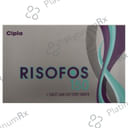Risedronate
Uses
Risedronate is used in the treatment of osteoporosis. It is effective for managing osteoporosis in postmenopausal women and men at high risk of fractures.
How it Works
How Risedronate works Risedronate is a bisphosphonate that suppresses the activity of osteoclasts, the cells responsible for bone destruction. This action strengthens the bones and reduces the risk of fractures.
Side Effects
Common side effects of Risedronate include headache, back pain, diarrhea, rash, joint pain, muscle pain, nausea, abdominal pain, constipation, dyspepsia, dizziness, arrhythmia (irregular heartbeats), peripheral edema, urinary tract infection, and benign prostatic hyperplasia.
Expert Advice
- Your doctor has prescribed Risedronate to strengthen your bones and reduce the risk of fractures.
- Take Risedronate in the morning at least 30 minutes before eating or drinking anything.
- Maintain an upright posture for 30 minutes after taking the medication to prevent irritation of your esophagus.
- Risedronate may lower the calcium levels in your blood.
- Include calcium-rich foods in your diet and have regular blood tests to monitor your calcium levels.
- It is essential to take Risedronate on an empty stomach.
- Do not lie down after taking the medication.
- Wait at least 1 hour before taking any other medications or consuming food or drinks.
- Consider taking calcium and vitamin D supplements to support bone health while on Risedronate.
- Avoid taking Risedronate during pregnancy or while breastfeeding.
- Inform your doctor if you become pregnant while taking Risedronate.
- Notify your doctor if you experience jaw pain, which may occur after dental procedures.
- Your doctor will monitor your response to Risedronate by testing your bone mineral density (BMD) every 1-3 years.
- It is important to maintain good oral hygiene while taking this medication.
- Schedule regular dental check-ups and inform your dentist that you are taking Risedronate.
Related Medications
Risedronate 35mg

₹130.5
MRP ₹261
Risedronate 35mg

₹150

₹130.5
MRP ₹261
Risedronate 35mg

₹2,310

₹130.5
MRP ₹261
Risedronate 35mg

₹94.2

₹130.5
MRP ₹261
Risedronate 35mg

₹210

₹130.5
MRP ₹261
Risedronate 35mg

₹142.9

₹130.5
MRP ₹261
Risedronate 35mg

₹292.5

₹130.5
MRP ₹261
Calcium Carbonate 500mg + Risedronate 35mg + Vitamin D3 (Cholecalciferol) 0.2mcg + Zinc (Elemental Zinc) 7.5mg

₹201.9
MRP ₹246.3
Calcium Carbonate 500mg + Risedronate 35mg + Vitamin D3 (Cholecalciferol) 0.2mcg + Zinc (Elemental Zinc) 7.5mg

₹88

₹242
MRP ₹291.6
Calcium Carbonate 500mg + Risedronate 35mg + Vitamin D3 (Cholecalciferol) 0.2mcg + Zinc (Elemental Zinc) 7.5mg

₹242
MRP ₹291.6
Risedronate 35mg

₹383.4

₹130.5
MRP ₹261
Risedronate 150mg

₹390
Risedronate 75mg

₹160.5
Risedronate 150mg

₹287.5
Risedronate 35mg + Vitamin D3 (Cholecalciferol) 5600IU

₹306.2
Calcium Carbonate 500mg + Risedronate 35mg

₹120
Calcium Carbonate 250mg + Risedronate 35mg + Vitamin D3 (Cholecalciferol) 400IU

₹126
Calcium Carbonate 500mg + Risedronate 35mg + Vitamin D3 (Cholecalciferol) 500IU

₹63.8
Calcium Carbonate 500mg + Risedronate 35mg + Vitamin D3 (Cholecalciferol) 0.2mcg

₹105
Flat ₹100 off on first app order | Use Code: APP100 |
Flat ₹100 off on first app order
USE CODE: APP100

Download Now